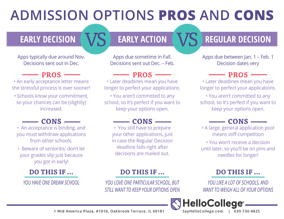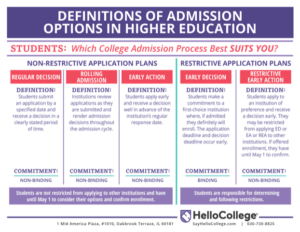College application deadlines can be terribly confusing for students and their parents. However, once you figure out what all of the deadlines types are, you can formulate an appropriate application strategy. This is a critical part of the college application process to ensure your student gains admittance and a financial aid package that meets your needs. As soon as students finalize their list of schools, they should sit down with their counselor and plan out when and how they will send out college applications based on what deadline options you want to employ.
Types of College Application Deadlines
Outlined below, you will find clear definitions for each type of college application deadline. Specific deadlines will vary from college to college and university to university; however, the types of college application deadlines for the Fall of 2020 are listed below.
Early Decision (EDI) and Early Decision II (EDII)
This is the best way to demonstrate interest in a college. It’s important to understand, however, that Early Decision is a binding agreement. In other words, if you apply Early Decision to a college and are accepted, you have to attend that school and withdraw all your other applications. Part of what this means is that you won’t have the opportunity to wait and find out about financial aid and scholarship packages from other schools.
Nevertheless, applying Early Decision can be advantageous because the acceptance rates are often significantly higher than with the Regular Decision pool. For the vast majority of schools, the Early Decision college application deadline is on or around Nov. 1 with decisions being revealed around mid-December.

Your College Admissions Journey, Mapped Out!
Introducing our college planning timeline with a handy checklist of essential tasks, a step-by-step guide for every grade level, from freshman to senior year, AND financial aid, college applications, extracurricular activities, and more.
Some schools offer an Early Decision II option, which oftentimes has a deadline on or around Jan. 1. ED II plans afford students the opportunity to make a binding commitment at a later date. This may be a useful option for students who were denied at their top choice school after applying ED I.
Note: Never apply Early Decision to a college you haven’t visited; that’s akin to buying a house without ever having set foot on the property.
Early Action (EA)
Early Action is ideal because you receive an admissions decision early in the process without the binding commitment that comes with Early Decision. The application deadline is typically on or around Nov. 1, and by Christmas, you should know whether you were accepted, denied, or deferred into the Regular Decision pool. Even a denial, while disappointing, is helpful because you find out relatively early whether you should move on and focus your attention on other schools.
Regular Decision
Regular Decision is just that—the standard application deadline. This is usually anywhere from Dec. 1 to Jan. 1, and sometimes as late as Feb. 1. By late March, you should have a decision and a financial aid package, including merit-based awards. Regular Decision is particularly beneficial for late-bloomers because it enables them to include their seventh-semester grades in their application.

Rolling Admissions
You primarily see this practice at large public research institutions such as the University of Iowa. It simply means that admission decisions are made as applications roll in the door. You might apply on Nov. 3 and have a decision by Nov. 5. Typically, these schools receive applications throughout the entire season and continue to admit students until their class is full. Rolling Admissions isn’t a great benefit to students—it’s more of a protocol for the university. However, it is sometimes good for the soul to score a quick “admit” decision.
Restrictive Early Action
Stanford is the best-known school for Restrictive Early Action, although Notre Dame and a handful of other schools have a variation of it. Restrictive Early Action isn’t a binding agreement, but students are limited regarding the other schools to which they can apply Early Action. Basically, the school is saying, “You can only apply Early Action here.” Although this route narrows your options, it provides you with a leg up as far as demonstrating your interest in a college.
Open Admissions
Probably the most laid back option, open admissions means practically any student who applies and meets the requirements will get in. It is more commonly offered by community colleges or online schools, where enrollment numbers don’t tend to create overcrowding issues.
Students with low GPAs may benefit from a school that has open admissions. As long as they meet the minimum requirements, admission is almost a sure bet.
Early Evaluation
Early evaluation doesn’t necessarily lead to early admission. Instead, your student can submit their materials by the deadline, and they will be reviewed in advance. The school then lets your child know if they have a good, fair, or poor chance of getting in, giving them valuable information regarding whether they need to keep applying elsewhere.
Just keep in mind that the results of an early evaluation are not binding. Even if a college says your child has a good chance of being accepted, they aren’t guaranteed a spot based on this college admissions information alone.
Deferred College Admissions
With COVID-19 concerns US News and World Report observes that many students and their families are considering deferring college admissions. What does that mean exactly? When a family decides to defer college admissions, your student finds out if they would receive acceptance by the school but opts to delay attending for a year.
For example, if your student is a high school senior, set to graduate in summer 2021, they would opt out of heading to college for the 2021-2022 school year and instead would begin their college education in the 2022-2023 school year.
This works well for students who want to take a gap year. Then, they can spend some time interning, traveling, or even working to help pay for college before actually heading to school.
At times, colleges may offer a student deferred admission even if they didn’t apply for it specifically. This can happen if a student has solid credentials but a program is particularly competitive, or the college is especially popular. Effectively, the school gives a student a chance to attend, just not in the upcoming school year.
Accepting a deferred admission offer does typically guarantee your student a slot, but there can be conditions. For example, they may have to come in as a freshman, meaning they can’t spend a year at another school and then transfer to their preferred school. It’s also possible that agreeing to a deferred enrollment may be binding, which means your student is legally obligated to attend

Apply Strategically
Across the board, the college admissions landscape is changing. It’s important that your family create a strategic plan going into this admissions season based on your desired outcomes. Our advisors at HelloCollege are highly trained to identify student goals and create a path to getting in. Be sure your family has a smart plan.



